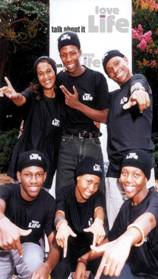South African youth service programme shows positive impacts on youth development
 |
Volunteers who graduate from the loveLife groundBREAKER programme go on to play leadership roles and have good prospects for employment
|
Findings from a study conducted by Volunteer and Service Enquiry Southern Africa (VOSESA) [1] show that graduates of one of the largest youth service programmes in South Africa, the loveLife groundBREAKERS, hold overwhelmingly positive attitudes towards volunteering and engaged citizenship, go on to play leadership roles in community organisations and have good prospects of education and employment. This is significant when compared with research that shows that more than two-thirds of young South Africans had never participated in a community sports team, society or club (Morrow, Panday and Richter, 2005).
groundBREAKER graduates also have better prospects of accessing further educational opportunities: 17% of the groundBREAKER graduates are currently studying at post-matric level compared to 10% of young people nationally who are studying at the same level (General Household Survey, 2004).
The loveLife groundBREAKERS programme
The loveLife groundBREAKERS programme draws young people between the ages of 18 and 25 into voluntary youth service for a period of one year to support national HIV prevention programmes aimed at young people. The groundBREAKERS are given a stipend of R890 per month. Their role is to implement HIV/AIDS and lifestyle education programmes throughout South Africa and they operate at loveLife sites, National Adolescent Friendly Clinics and high schools.
groundBREAKERS are highly motivated young people who use their energy and personal drive to motivate their peers to envision a future without AIDS and to make personal life choices that will keep them free of HIV. Each groundBREAKER is supported by at least five mpintshis (friends) who volunteer without compensation.
VOSESA was contracted by loveLife to assess the direction that the lives of the groundBREAKER graduates had taken following their groundbBREAKER experience, determine the extent to which they had continued their service and leadership at community level, and gauge their perceptions of the impact of the programme on their own development.
Methodology
VOSESA conducted telephone interviews with 644 groundBREAKERS who graduated from the programme between 2001 and 2005. A multi-stage stratified cluster sample of groundBREAKERS from the 200 larger loveLife sites, stratified by type of hub (community-based organisation, public clinic, school or loveLife Y centre) and province ensured a representative sample.
Survey results
Commitment to service and volunteering
The results of the survey show that slightly more than one-half of groundBREAKER graduates are currently doing volunteer work, just over one-third belong to community organisations and about half of the groundBREAKERS who had not volunteered when they entered the programme, now do. This suggests that the groundBREAKER programme had an impact in stimulating an interest in volunteering and in keeping volunteers committed to civic engagement.
The data also show that groundBREAKER graduates are generally positive in their attitudes towards volunteering. The only possible area of concern was the finding that 12% of the respondents thought that volunteering was only for people who did not have jobs.
Education
A key area of concern in South Africa is addressing the skills deficits in the labour force. While the groundBREAKER programme imparts specific skills such as networking, communication and administrative skills, another of its goals is to encourage the young servers to continue their education. The data show that the programme has been successful in achieving this goal.
Forty-five per cent of groundBREAKER graduates pursued further studies following completion of the programme. This is significant when compared with the national data, which shows that 30% of young people continue their studies after matriculating (CASE, 2000). In addition, nearly 50% of groundBREAKER graduates now have some level of post-matriculation qualification (degrees or diplomas) compared to only 8% who had such a qualification on entry into the programme.
Ninety-seven per cent of all the respondents who continued with their studies indicated that the groundBREAKER programme had influenced or strongly influenced their decision to continue with their education.
Employment
The 2008 International Association for National Youth Service Conference highlighted the contribution of youth service and volunteering towards increasing the employability of youth. The groundBREAKERS study confirms this. Those who volunteered through groundBREAKERS increased their own employability with approximately 60% of groundBREAKER graduates having found employment. About two-thirds of these graduates are employed full-time.
At 38% the unemployment rate of groundBREAKER graduates is significantly lower than the overall unemployment rate among African youth with matric (approximately 51% according to the 2005 Labour Force Survey). This could indicate that the programme has had a positive influence on its graduates’ marketability, motivation and access to opportunities. A factor may be the social networks that the programme opens for the participants, although this is speculative in the absence of further research.
Of those groundBREAKERS who are employed, 70% indicated that they were happy with their current job and just under two-thirds indicated that the job that they had offered good opportunities for the future. This is noteworthy given the fact that many youth in South Africa are employed in the casual labour market with little job security or prospects for growth and development.
Conclusion
This study suggests that involvement in civic service and volunteering can have a significant impact on the lives and future prospects of young people. The groundBREAKERS programme has led to its graduates becoming more involved in community service through leadership, more employable, has encouraged them to continue their studies, and has helped them find meaningful job opportunities.
- Rejoice Shumba
References
Morrow S, Panday S and Richter L (2005) Where we’re at and where we’re going: Young people in South Africa in 2005. Johannesburg: Umsobomvu Youth Fund.
Statistics South Africa (2004) The General Household Survey. Available online: http://www.nrf.ac.za/sada/ahdetails.asp?catalognumber=0142.
[1] VOSESA was commissioned by loveLife to conduct a survey that captures self-reported impacts from a representative sample of groundBREAKER graduates aged 18 to 30 drawn from 2001 to 2006. The survey was conducted in 2007/08.